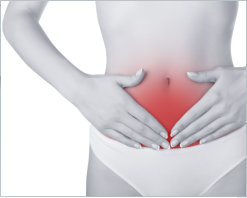[Home] [Irritable Bowel Syndrome] [Diarrhoea] [Digestive Disorders] [Coeliac Disease] [Colon Cleansing] [Constipation] [Digestive Health] [Bowel Problems] [Bad breath] [Candida albicans]





Coeliac disease
What is coeliac disease?
Coeliac disease (pronounced see-liac, written celiac in some countries) is a lifelong autoimmune disease - not an intolerance as is
frequently assumed. This means that the body's immune system attacks its own tissues, by way of the production of antibodies.
This response is triggered by gluten, which is a protein composite seen in wheat and similar cereals, like barley and rye. If eaten by
those with coeliac disease, it inflames and damages the lining of the small intestine. In fact, as little as 1/30th of a slice of bread can
cause intestinal damage to those with the disease.
The principal functions of the small intestine are to break down and soak up the nutrients in food. In untreated coeliac disease, the
cells lining the small intestine end up flat and inflamed and their surface area is substantially lowered.
This ultimately means a reduction in the intake of nutrients from food and can certainly lead to poor nutrition and insufficiencies in
vitamins, iron, folic acid and calcium. Sugars, proteins and fats will often be badly assimilated likewise.
Combined with malabsorption, untreated coeliac disease can even lead to a predisposition to gastrointestinal malignancy, specially
carcinoma of the oropharynx and oesophagus and small bowel lymphoma. It is also closely linked to dermatitis herpetiformis, which
is actually an autoimmune blistering illness connected with a gluten-sensitive enteropathy.
What are the possible causes of coeliac disease?
The precise cause, or causes, of coeliac disease aren't yet known. Having said that, it is generally accepted that there are 3 crucial
factors that underlie its development. These include:
•
an environmental catalyst (gluten)
•
a genetic susceptibility
•
an unusually permeable gut (such as Leaky Gut Syndrome).
Once in a while, the strain of an operation, injury, intestinal infection or pregnancy may cause the start of the disease.
So how is coeliac disease clinically diagnosed?
Studies have shown that coeliac disease affects 1% of individuals in the United Kingdom, rendering it even more prevalent than
considered in the past. In addition, under-diagnosis is a significant problem and research indicates that about half a million
individuals have not yet been clinically diagnosed.
Coeliac disease might be diagnosed at any age. Even a baby can be diagnosed - after weaning, when cereals incorporating gluten
are first brought into their diet. Having said that, the most common age of diagnosis is anywhere between 40 and 60 years of age.
What are the signs and symptoms of coeliac disease?
The symptoms of coeliac disease vary from one person to another and may range from mild to extreme - it affects individuals
differently.
Symptoms may appear in the digestive system, or possibly in other regions of the body. For instance, one particular person may
have diarrhoea and abdominal discomfort, whilst another individual might be short-tempered or despondent. Irritability is amongst
the most common symptoms in children.
Several of the most commonplace symptoms include: tiredness, anaemia, diarrhoea, belly discomfort, weight reduction, throwing up
and mouth ulcers.
Interestingly, some people display no symptoms at all. Although this may sound like a good thing, these people continue to be at
risk of the complications relating to the disease. The longer a person goes undiagnosed and untreated, the greater the chance of
developing malnutrition and also other complications. Anaemia, stunted growth and weight loss are indications of malnutrition,
because the body is simply not receiving adequate vitamins and minerals.
Additionally, increased incidence of rheumatoid arthritis, diabetes mellitus, autoimmune thyroid disease, sarcoidosis, vasculitis,
pulmonary fibrosis, osteoporosis, infertility and cancer of the gut has been revealed in coeliac patients.
How is coeliac disease managed?
Sadly, there is at present no known cure for coeliac disease. The main treatment plan, which is generally successful, is therefore to
eliminate all sources of gluten in the diet. This process is also effective in cases of dermatitis herpetiformis. Contamination of gluten-
free products with gluten remains a possible difficulty.
A gluten-free eating plan is a lifelong commitment and sticking to a restricted diet is challenging; gluten is in various staple foods
that are eaten on a daily basis. Improvement of symptoms may also take several months and calls for patience and staying-power.
Coeliacs often find that vitamin and mineral supplements are beneficial when they are on a demanding gluten-free meal plan, as
they can help to ensure that they are getting the broad spectrum of nutrients which they need. In particular, nutrients-fortified
gluten-free meal replacement powders can be a very easy and effective way to do this.
*Before changing your eating habits or taking health supplements, always be sure to consult your physician or qualified health
practitioner (particularly if you are pregnant, breastfeeding or on medications).

Diarrhoea and other digestive health problems




